Systematic Literature Review: Ethical Consumer Choices and Motivations
VerifiedAdded on 2023/03/30
|17
|3391
|165
Literature Review
AI Summary
This literature review examines the growing trend of ethical consumerism and investigates the reasons behind people's ethical consumer choices. It focuses on a case study of ShopHere, an Australian multi-channel retailer, and explores the research question of why consumers make ethical choices. The study aims to determine the impact of product cost, ethical consumption trends, and self-sustainability on consumer behavior. The review synthesizes findings from various academic sources, including peer-reviewed journal papers, exploring factors influencing ethical purchasing decisions. Key factors identified include need for cognition, emotional responses, parental and peer support, moral intuition, and organizational processes. External factors also play a role. The review highlights the importance of understanding consumer behavior for businesses to implement ethical production and consumption policies. The conclusion emphasizes the need for further research, particularly in the context of e-commerce and retail, to understand how these factors influence consumer choices in the Australian market and help businesses categorize customers and formulate sustainable ethical production processes. The review draws on empirical studies to provide a comprehensive overview of the current research landscape.
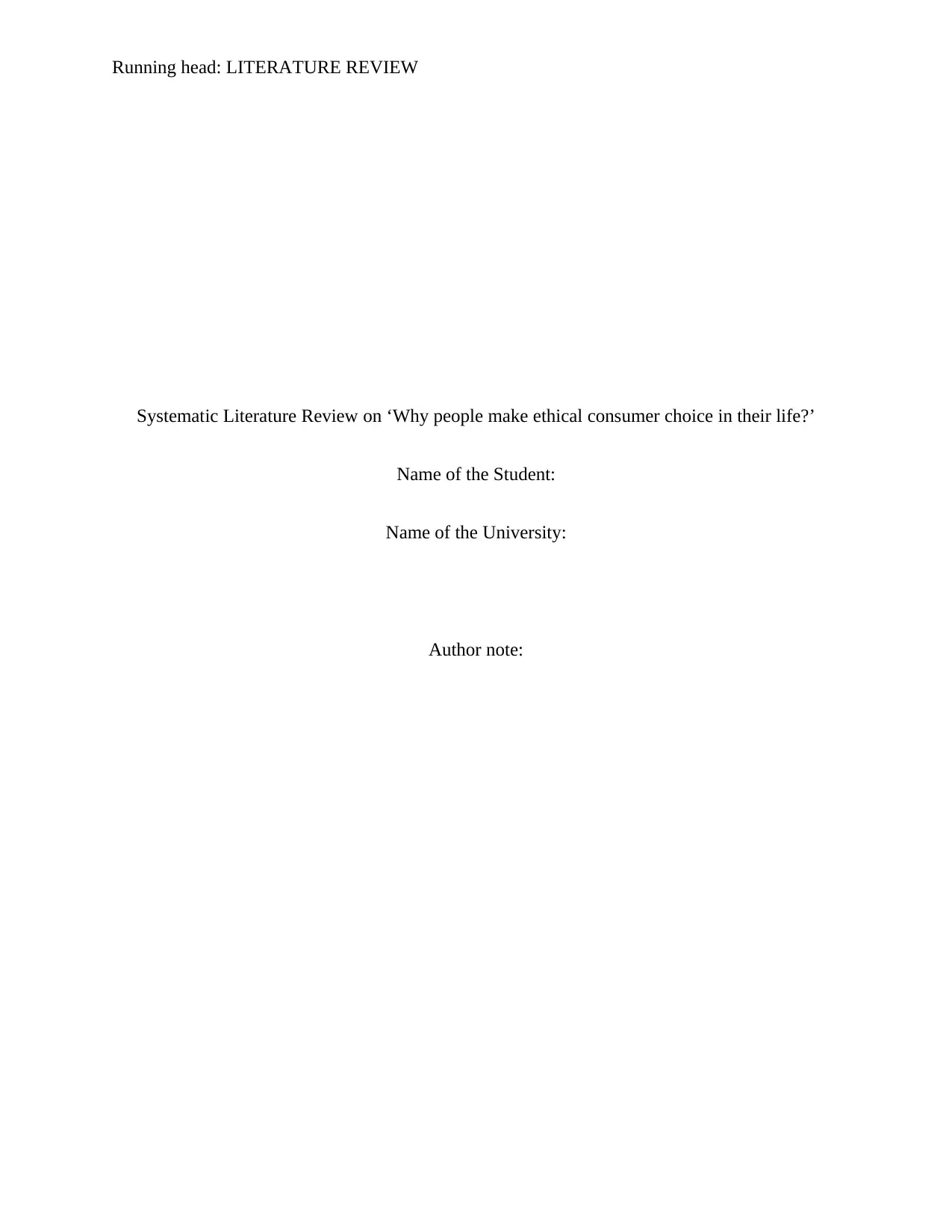
Running head: LITERATURE REVIEW
Systematic Literature Review on ‘Why people make ethical consumer choice in their life?’
Name of the Student:
Name of the University:
Author note:
Systematic Literature Review on ‘Why people make ethical consumer choice in their life?’
Name of the Student:
Name of the University:
Author note:
Paraphrase This Document
Need a fresh take? Get an instant paraphrase of this document with our AI Paraphraser
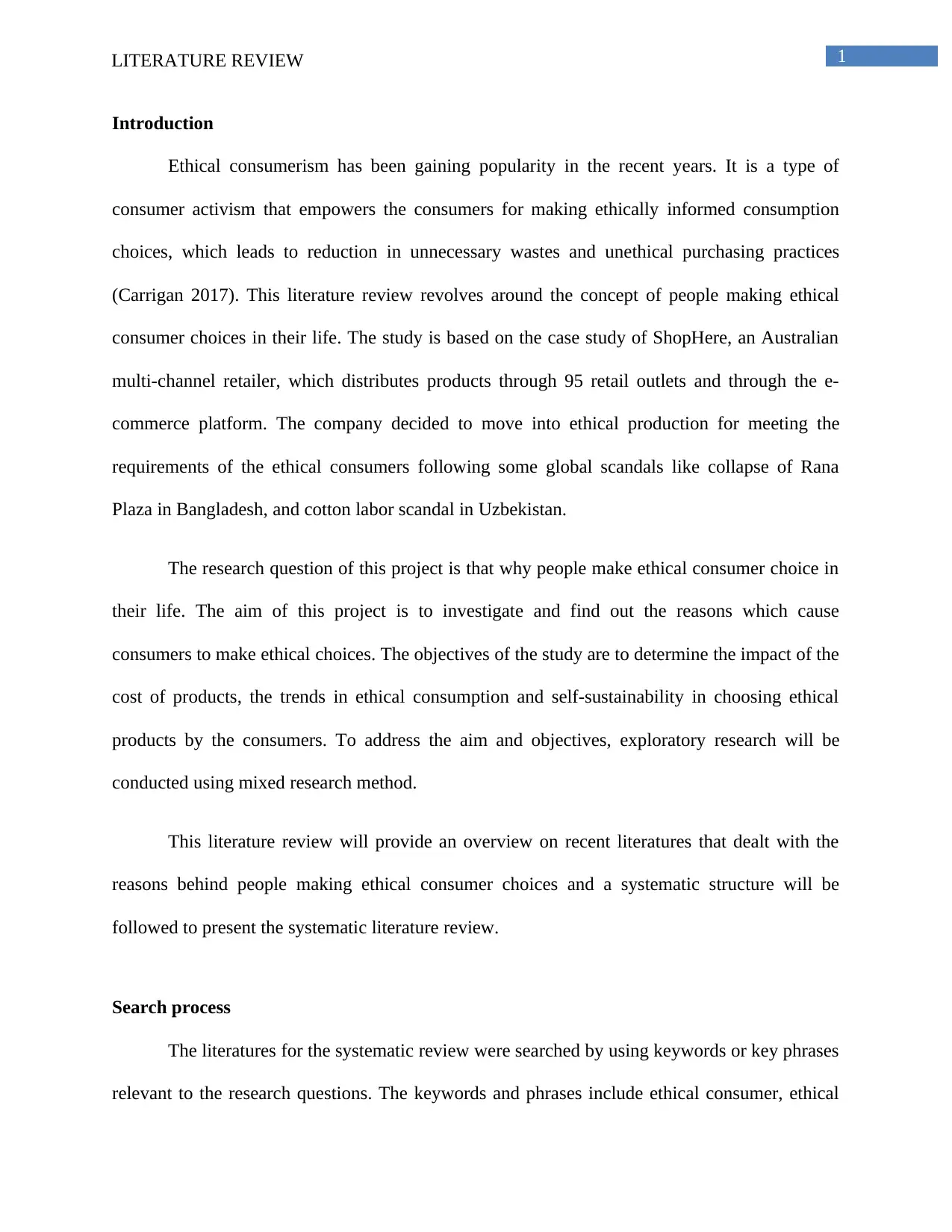
1LITERATURE REVIEW
Introduction
Ethical consumerism has been gaining popularity in the recent years. It is a type of
consumer activism that empowers the consumers for making ethically informed consumption
choices, which leads to reduction in unnecessary wastes and unethical purchasing practices
(Carrigan 2017). This literature review revolves around the concept of people making ethical
consumer choices in their life. The study is based on the case study of ShopHere, an Australian
multi-channel retailer, which distributes products through 95 retail outlets and through the e-
commerce platform. The company decided to move into ethical production for meeting the
requirements of the ethical consumers following some global scandals like collapse of Rana
Plaza in Bangladesh, and cotton labor scandal in Uzbekistan.
The research question of this project is that why people make ethical consumer choice in
their life. The aim of this project is to investigate and find out the reasons which cause
consumers to make ethical choices. The objectives of the study are to determine the impact of the
cost of products, the trends in ethical consumption and self-sustainability in choosing ethical
products by the consumers. To address the aim and objectives, exploratory research will be
conducted using mixed research method.
This literature review will provide an overview on recent literatures that dealt with the
reasons behind people making ethical consumer choices and a systematic structure will be
followed to present the systematic literature review.
Search process
The literatures for the systematic review were searched by using keywords or key phrases
relevant to the research questions. The keywords and phrases include ethical consumer, ethical
Introduction
Ethical consumerism has been gaining popularity in the recent years. It is a type of
consumer activism that empowers the consumers for making ethically informed consumption
choices, which leads to reduction in unnecessary wastes and unethical purchasing practices
(Carrigan 2017). This literature review revolves around the concept of people making ethical
consumer choices in their life. The study is based on the case study of ShopHere, an Australian
multi-channel retailer, which distributes products through 95 retail outlets and through the e-
commerce platform. The company decided to move into ethical production for meeting the
requirements of the ethical consumers following some global scandals like collapse of Rana
Plaza in Bangladesh, and cotton labor scandal in Uzbekistan.
The research question of this project is that why people make ethical consumer choice in
their life. The aim of this project is to investigate and find out the reasons which cause
consumers to make ethical choices. The objectives of the study are to determine the impact of the
cost of products, the trends in ethical consumption and self-sustainability in choosing ethical
products by the consumers. To address the aim and objectives, exploratory research will be
conducted using mixed research method.
This literature review will provide an overview on recent literatures that dealt with the
reasons behind people making ethical consumer choices and a systematic structure will be
followed to present the systematic literature review.
Search process
The literatures for the systematic review were searched by using keywords or key phrases
relevant to the research questions. The keywords and phrases include ethical consumer, ethical
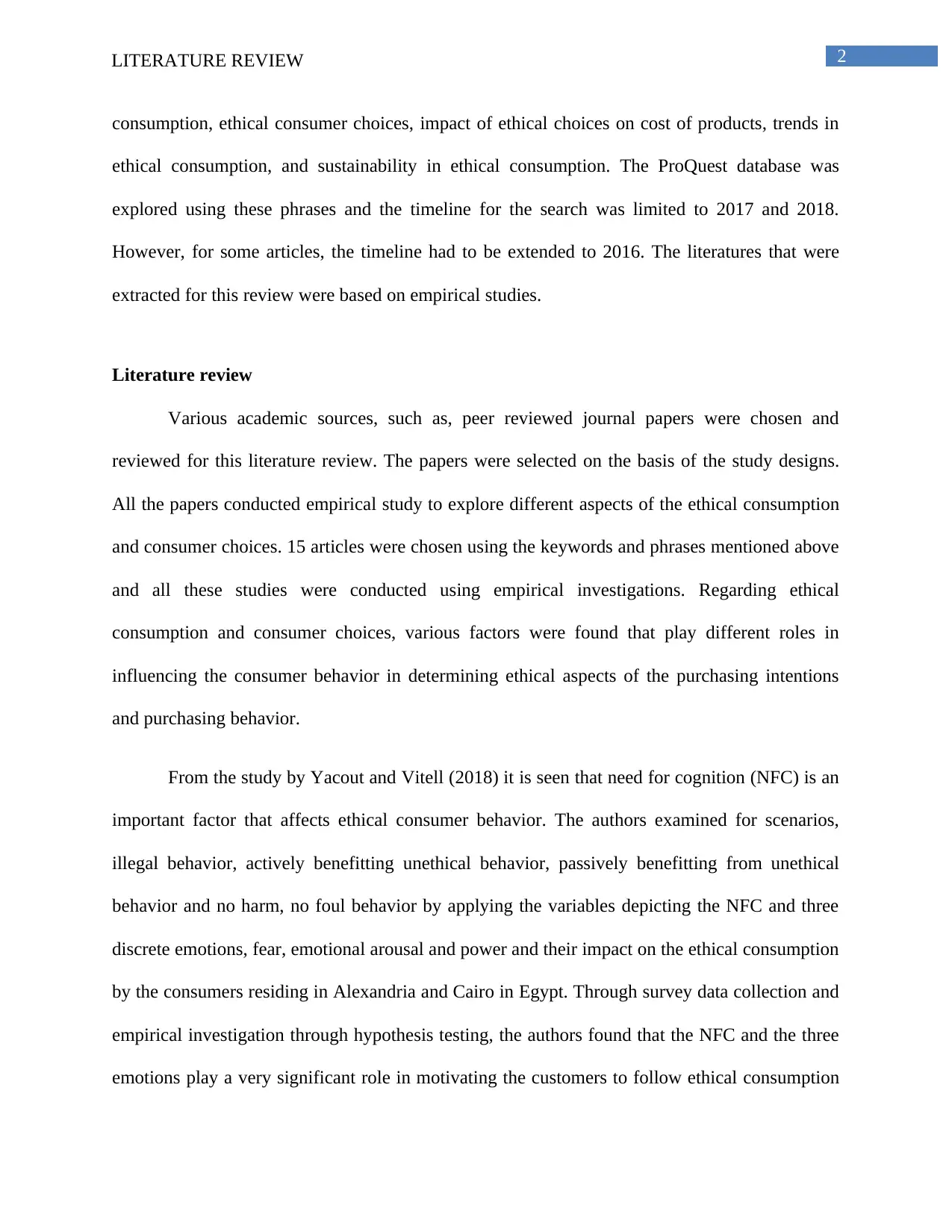
2LITERATURE REVIEW
consumption, ethical consumer choices, impact of ethical choices on cost of products, trends in
ethical consumption, and sustainability in ethical consumption. The ProQuest database was
explored using these phrases and the timeline for the search was limited to 2017 and 2018.
However, for some articles, the timeline had to be extended to 2016. The literatures that were
extracted for this review were based on empirical studies.
Literature review
Various academic sources, such as, peer reviewed journal papers were chosen and
reviewed for this literature review. The papers were selected on the basis of the study designs.
All the papers conducted empirical study to explore different aspects of the ethical consumption
and consumer choices. 15 articles were chosen using the keywords and phrases mentioned above
and all these studies were conducted using empirical investigations. Regarding ethical
consumption and consumer choices, various factors were found that play different roles in
influencing the consumer behavior in determining ethical aspects of the purchasing intentions
and purchasing behavior.
From the study by Yacout and Vitell (2018) it is seen that need for cognition (NFC) is an
important factor that affects ethical consumer behavior. The authors examined for scenarios,
illegal behavior, actively benefitting unethical behavior, passively benefitting from unethical
behavior and no harm, no foul behavior by applying the variables depicting the NFC and three
discrete emotions, fear, emotional arousal and power and their impact on the ethical consumption
by the consumers residing in Alexandria and Cairo in Egypt. Through survey data collection and
empirical investigation through hypothesis testing, the authors found that the NFC and the three
emotions play a very significant role in motivating the customers to follow ethical consumption
consumption, ethical consumer choices, impact of ethical choices on cost of products, trends in
ethical consumption, and sustainability in ethical consumption. The ProQuest database was
explored using these phrases and the timeline for the search was limited to 2017 and 2018.
However, for some articles, the timeline had to be extended to 2016. The literatures that were
extracted for this review were based on empirical studies.
Literature review
Various academic sources, such as, peer reviewed journal papers were chosen and
reviewed for this literature review. The papers were selected on the basis of the study designs.
All the papers conducted empirical study to explore different aspects of the ethical consumption
and consumer choices. 15 articles were chosen using the keywords and phrases mentioned above
and all these studies were conducted using empirical investigations. Regarding ethical
consumption and consumer choices, various factors were found that play different roles in
influencing the consumer behavior in determining ethical aspects of the purchasing intentions
and purchasing behavior.
From the study by Yacout and Vitell (2018) it is seen that need for cognition (NFC) is an
important factor that affects ethical consumer behavior. The authors examined for scenarios,
illegal behavior, actively benefitting unethical behavior, passively benefitting from unethical
behavior and no harm, no foul behavior by applying the variables depicting the NFC and three
discrete emotions, fear, emotional arousal and power and their impact on the ethical consumption
by the consumers residing in Alexandria and Cairo in Egypt. Through survey data collection and
empirical investigation through hypothesis testing, the authors found that the NFC and the three
emotions play a very significant role in motivating the customers to follow ethical consumption
⊘ This is a preview!⊘
Do you want full access?
Subscribe today to unlock all pages.

Trusted by 1+ million students worldwide
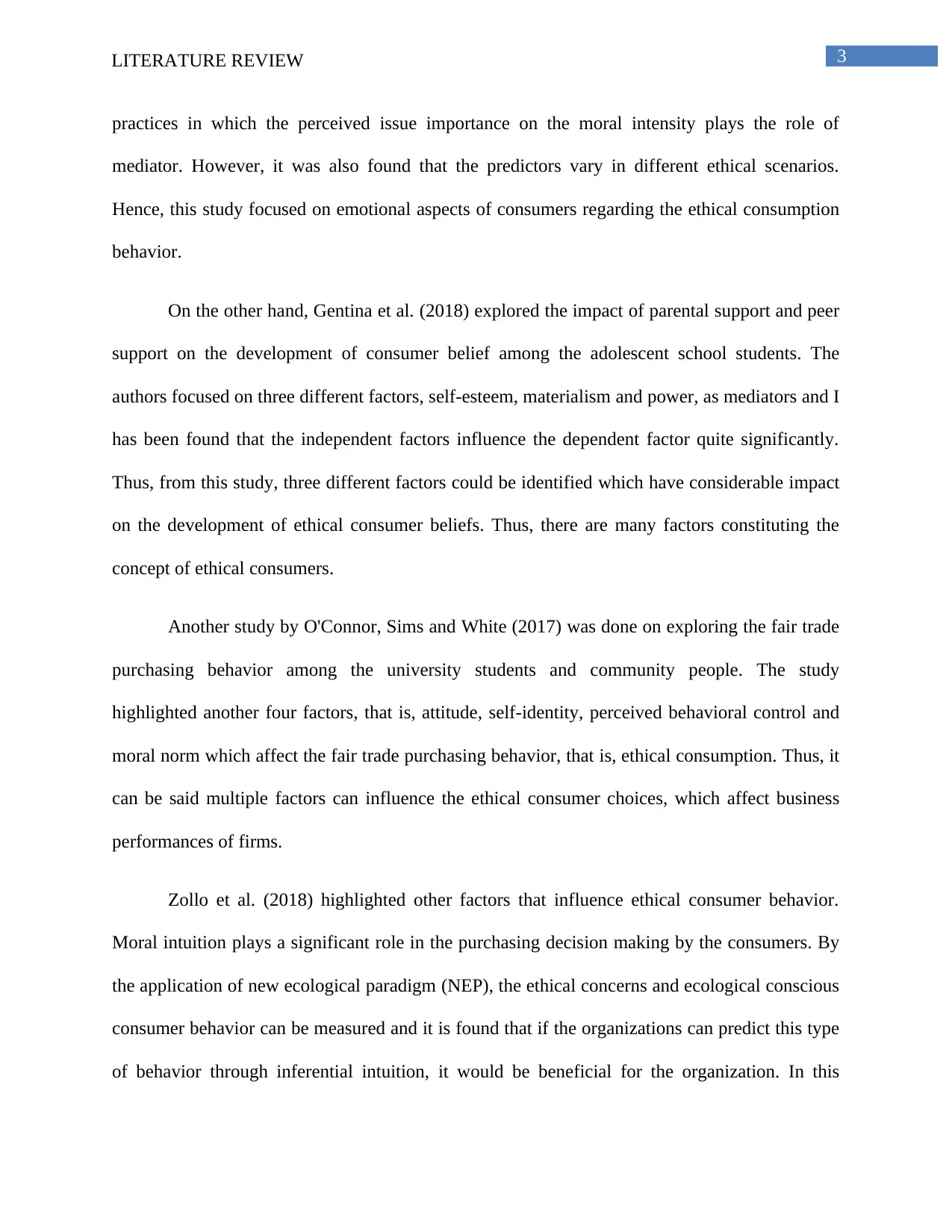
3LITERATURE REVIEW
practices in which the perceived issue importance on the moral intensity plays the role of
mediator. However, it was also found that the predictors vary in different ethical scenarios.
Hence, this study focused on emotional aspects of consumers regarding the ethical consumption
behavior.
On the other hand, Gentina et al. (2018) explored the impact of parental support and peer
support on the development of consumer belief among the adolescent school students. The
authors focused on three different factors, self-esteem, materialism and power, as mediators and I
has been found that the independent factors influence the dependent factor quite significantly.
Thus, from this study, three different factors could be identified which have considerable impact
on the development of ethical consumer beliefs. Thus, there are many factors constituting the
concept of ethical consumers.
Another study by O'Connor, Sims and White (2017) was done on exploring the fair trade
purchasing behavior among the university students and community people. The study
highlighted another four factors, that is, attitude, self-identity, perceived behavioral control and
moral norm which affect the fair trade purchasing behavior, that is, ethical consumption. Thus, it
can be said multiple factors can influence the ethical consumer choices, which affect business
performances of firms.
Zollo et al. (2018) highlighted other factors that influence ethical consumer behavior.
Moral intuition plays a significant role in the purchasing decision making by the consumers. By
the application of new ecological paradigm (NEP), the ethical concerns and ecological conscious
consumer behavior can be measured and it is found that if the organizations can predict this type
of behavior through inferential intuition, it would be beneficial for the organization. In this
practices in which the perceived issue importance on the moral intensity plays the role of
mediator. However, it was also found that the predictors vary in different ethical scenarios.
Hence, this study focused on emotional aspects of consumers regarding the ethical consumption
behavior.
On the other hand, Gentina et al. (2018) explored the impact of parental support and peer
support on the development of consumer belief among the adolescent school students. The
authors focused on three different factors, self-esteem, materialism and power, as mediators and I
has been found that the independent factors influence the dependent factor quite significantly.
Thus, from this study, three different factors could be identified which have considerable impact
on the development of ethical consumer beliefs. Thus, there are many factors constituting the
concept of ethical consumers.
Another study by O'Connor, Sims and White (2017) was done on exploring the fair trade
purchasing behavior among the university students and community people. The study
highlighted another four factors, that is, attitude, self-identity, perceived behavioral control and
moral norm which affect the fair trade purchasing behavior, that is, ethical consumption. Thus, it
can be said multiple factors can influence the ethical consumer choices, which affect business
performances of firms.
Zollo et al. (2018) highlighted other factors that influence ethical consumer behavior.
Moral intuition plays a significant role in the purchasing decision making by the consumers. By
the application of new ecological paradigm (NEP), the ethical concerns and ecological conscious
consumer behavior can be measured and it is found that if the organizations can predict this type
of behavior through inferential intuition, it would be beneficial for the organization. In this
Paraphrase This Document
Need a fresh take? Get an instant paraphrase of this document with our AI Paraphraser
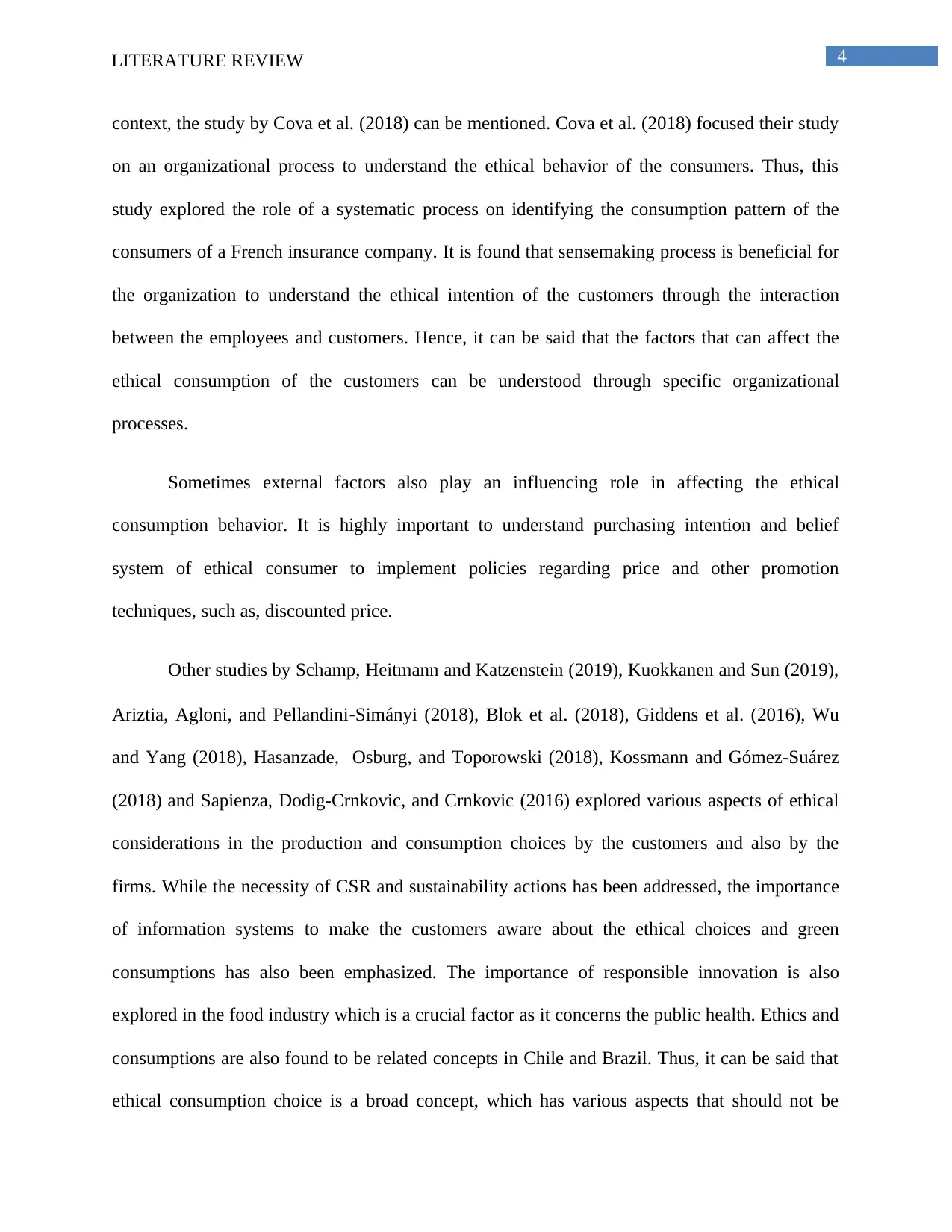
4LITERATURE REVIEW
context, the study by Cova et al. (2018) can be mentioned. Cova et al. (2018) focused their study
on an organizational process to understand the ethical behavior of the consumers. Thus, this
study explored the role of a systematic process on identifying the consumption pattern of the
consumers of a French insurance company. It is found that sensemaking process is beneficial for
the organization to understand the ethical intention of the customers through the interaction
between the employees and customers. Hence, it can be said that the factors that can affect the
ethical consumption of the customers can be understood through specific organizational
processes.
Sometimes external factors also play an influencing role in affecting the ethical
consumption behavior. It is highly important to understand purchasing intention and belief
system of ethical consumer to implement policies regarding price and other promotion
techniques, such as, discounted price.
Other studies by Schamp, Heitmann and Katzenstein (2019), Kuokkanen and Sun (2019),
Ariztia, Agloni, and Pellandini‐Simányi (2018), Blok et al. (2018), Giddens et al. (2016), Wu
and Yang (2018), Hasanzade, Osburg, and Toporowski (2018), Kossmann and Gómez-Suárez
(2018) and Sapienza, Dodig-Crnkovic, and Crnkovic (2016) explored various aspects of ethical
considerations in the production and consumption choices by the customers and also by the
firms. While the necessity of CSR and sustainability actions has been addressed, the importance
of information systems to make the customers aware about the ethical choices and green
consumptions has also been emphasized. The importance of responsible innovation is also
explored in the food industry which is a crucial factor as it concerns the public health. Ethics and
consumptions are also found to be related concepts in Chile and Brazil. Thus, it can be said that
ethical consumption choice is a broad concept, which has various aspects that should not be
context, the study by Cova et al. (2018) can be mentioned. Cova et al. (2018) focused their study
on an organizational process to understand the ethical behavior of the consumers. Thus, this
study explored the role of a systematic process on identifying the consumption pattern of the
consumers of a French insurance company. It is found that sensemaking process is beneficial for
the organization to understand the ethical intention of the customers through the interaction
between the employees and customers. Hence, it can be said that the factors that can affect the
ethical consumption of the customers can be understood through specific organizational
processes.
Sometimes external factors also play an influencing role in affecting the ethical
consumption behavior. It is highly important to understand purchasing intention and belief
system of ethical consumer to implement policies regarding price and other promotion
techniques, such as, discounted price.
Other studies by Schamp, Heitmann and Katzenstein (2019), Kuokkanen and Sun (2019),
Ariztia, Agloni, and Pellandini‐Simányi (2018), Blok et al. (2018), Giddens et al. (2016), Wu
and Yang (2018), Hasanzade, Osburg, and Toporowski (2018), Kossmann and Gómez-Suárez
(2018) and Sapienza, Dodig-Crnkovic, and Crnkovic (2016) explored various aspects of ethical
considerations in the production and consumption choices by the customers and also by the
firms. While the necessity of CSR and sustainability actions has been addressed, the importance
of information systems to make the customers aware about the ethical choices and green
consumptions has also been emphasized. The importance of responsible innovation is also
explored in the food industry which is a crucial factor as it concerns the public health. Ethics and
consumptions are also found to be related concepts in Chile and Brazil. Thus, it can be said that
ethical consumption choice is a broad concept, which has various aspects that should not be
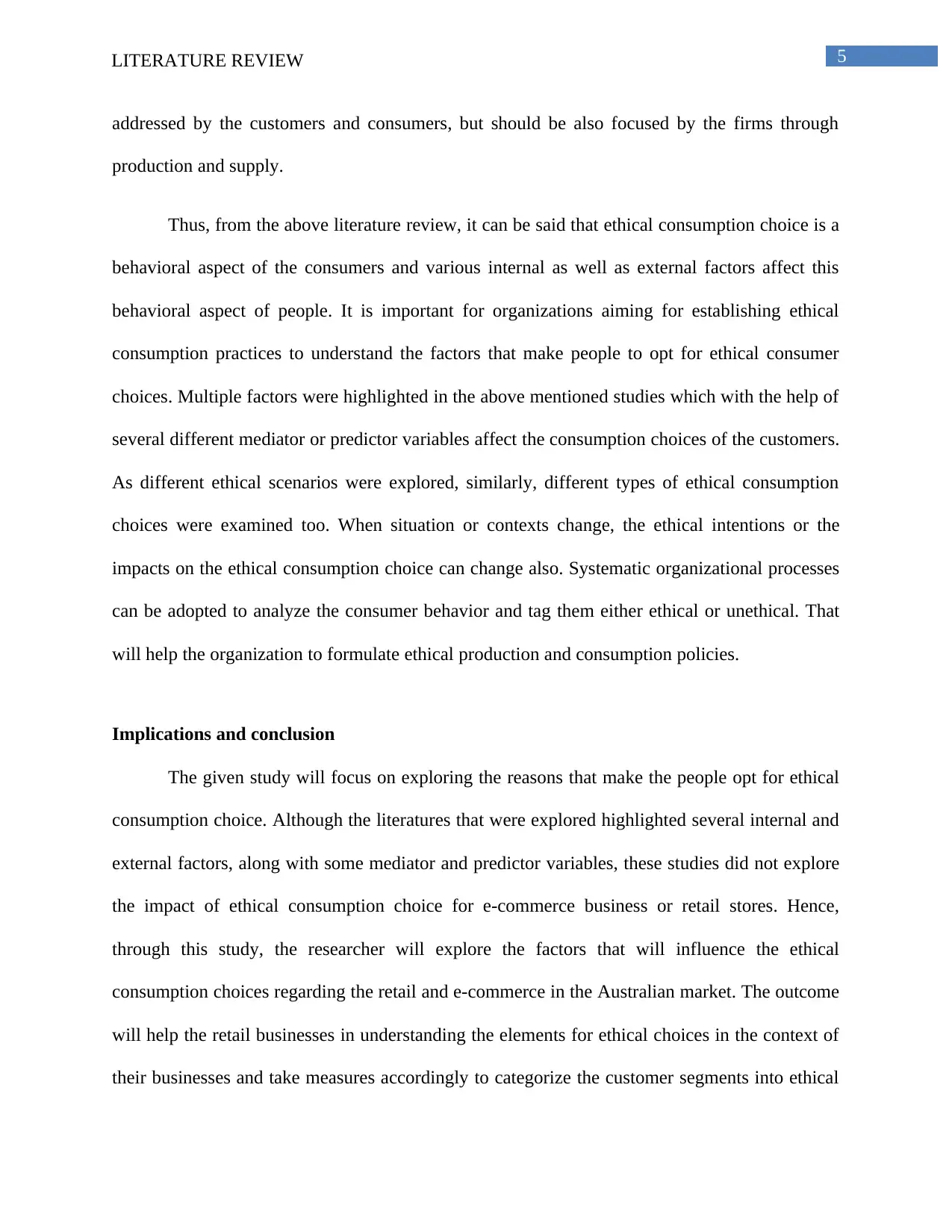
5LITERATURE REVIEW
addressed by the customers and consumers, but should be also focused by the firms through
production and supply.
Thus, from the above literature review, it can be said that ethical consumption choice is a
behavioral aspect of the consumers and various internal as well as external factors affect this
behavioral aspect of people. It is important for organizations aiming for establishing ethical
consumption practices to understand the factors that make people to opt for ethical consumer
choices. Multiple factors were highlighted in the above mentioned studies which with the help of
several different mediator or predictor variables affect the consumption choices of the customers.
As different ethical scenarios were explored, similarly, different types of ethical consumption
choices were examined too. When situation or contexts change, the ethical intentions or the
impacts on the ethical consumption choice can change also. Systematic organizational processes
can be adopted to analyze the consumer behavior and tag them either ethical or unethical. That
will help the organization to formulate ethical production and consumption policies.
Implications and conclusion
The given study will focus on exploring the reasons that make the people opt for ethical
consumption choice. Although the literatures that were explored highlighted several internal and
external factors, along with some mediator and predictor variables, these studies did not explore
the impact of ethical consumption choice for e-commerce business or retail stores. Hence,
through this study, the researcher will explore the factors that will influence the ethical
consumption choices regarding the retail and e-commerce in the Australian market. The outcome
will help the retail businesses in understanding the elements for ethical choices in the context of
their businesses and take measures accordingly to categorize the customer segments into ethical
addressed by the customers and consumers, but should be also focused by the firms through
production and supply.
Thus, from the above literature review, it can be said that ethical consumption choice is a
behavioral aspect of the consumers and various internal as well as external factors affect this
behavioral aspect of people. It is important for organizations aiming for establishing ethical
consumption practices to understand the factors that make people to opt for ethical consumer
choices. Multiple factors were highlighted in the above mentioned studies which with the help of
several different mediator or predictor variables affect the consumption choices of the customers.
As different ethical scenarios were explored, similarly, different types of ethical consumption
choices were examined too. When situation or contexts change, the ethical intentions or the
impacts on the ethical consumption choice can change also. Systematic organizational processes
can be adopted to analyze the consumer behavior and tag them either ethical or unethical. That
will help the organization to formulate ethical production and consumption policies.
Implications and conclusion
The given study will focus on exploring the reasons that make the people opt for ethical
consumption choice. Although the literatures that were explored highlighted several internal and
external factors, along with some mediator and predictor variables, these studies did not explore
the impact of ethical consumption choice for e-commerce business or retail stores. Hence,
through this study, the researcher will explore the factors that will influence the ethical
consumption choices regarding the retail and e-commerce in the Australian market. The outcome
will help the retail businesses in understanding the elements for ethical choices in the context of
their businesses and take measures accordingly to categorize the customer segments into ethical
⊘ This is a preview!⊘
Do you want full access?
Subscribe today to unlock all pages.

Trusted by 1+ million students worldwide
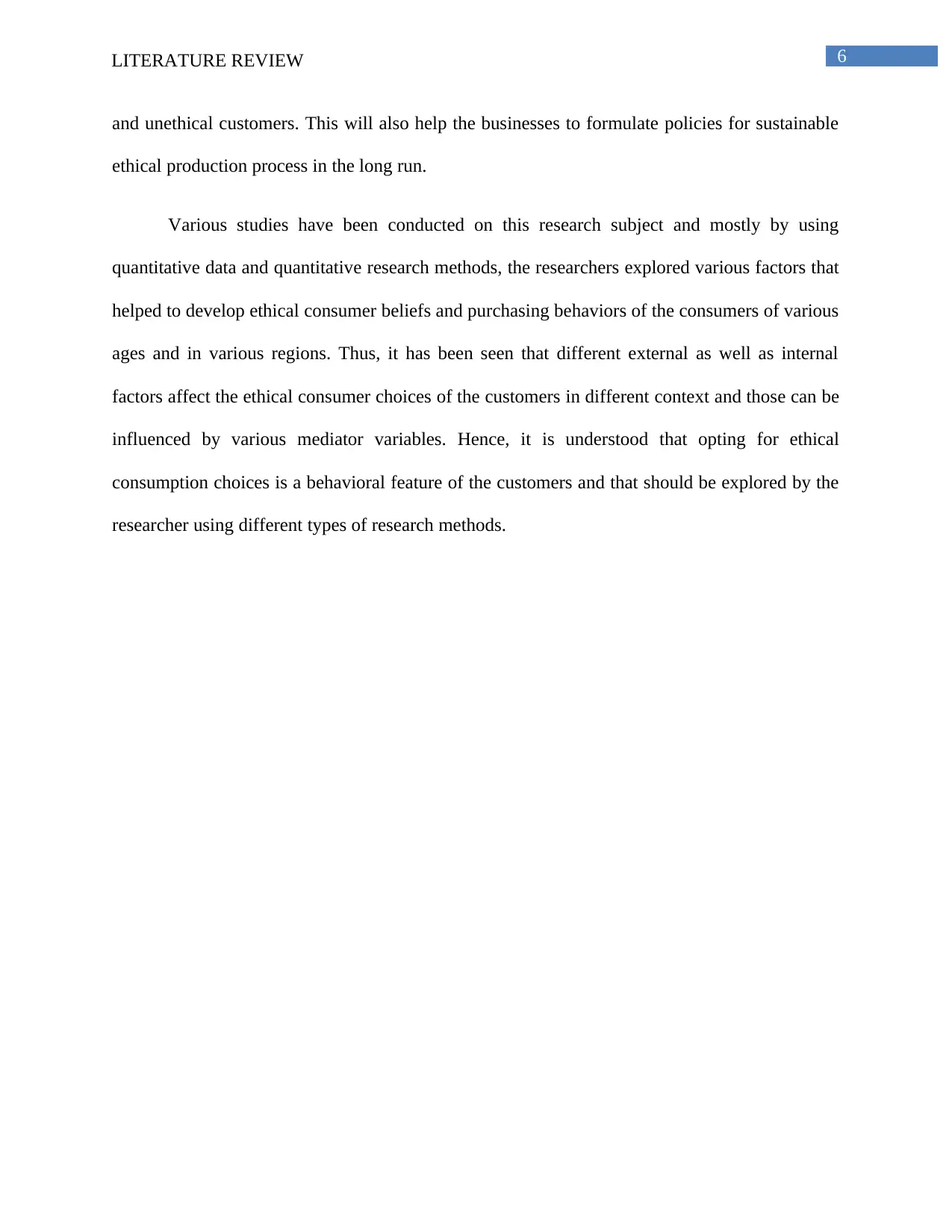
6LITERATURE REVIEW
and unethical customers. This will also help the businesses to formulate policies for sustainable
ethical production process in the long run.
Various studies have been conducted on this research subject and mostly by using
quantitative data and quantitative research methods, the researchers explored various factors that
helped to develop ethical consumer beliefs and purchasing behaviors of the consumers of various
ages and in various regions. Thus, it has been seen that different external as well as internal
factors affect the ethical consumer choices of the customers in different context and those can be
influenced by various mediator variables. Hence, it is understood that opting for ethical
consumption choices is a behavioral feature of the customers and that should be explored by the
researcher using different types of research methods.
and unethical customers. This will also help the businesses to formulate policies for sustainable
ethical production process in the long run.
Various studies have been conducted on this research subject and mostly by using
quantitative data and quantitative research methods, the researchers explored various factors that
helped to develop ethical consumer beliefs and purchasing behaviors of the consumers of various
ages and in various regions. Thus, it has been seen that different external as well as internal
factors affect the ethical consumer choices of the customers in different context and those can be
influenced by various mediator variables. Hence, it is understood that opting for ethical
consumption choices is a behavioral feature of the customers and that should be explored by the
researcher using different types of research methods.
Paraphrase This Document
Need a fresh take? Get an instant paraphrase of this document with our AI Paraphraser
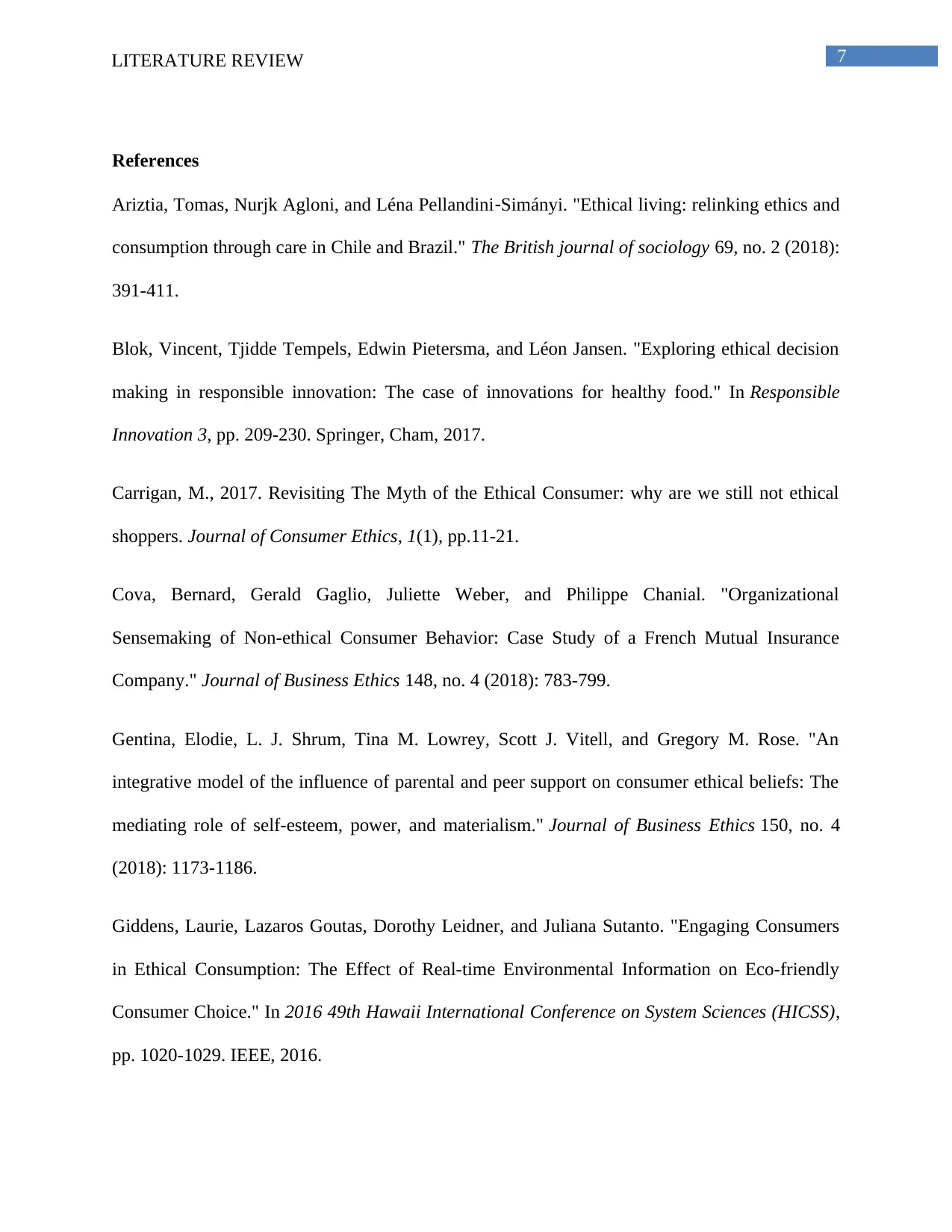
7LITERATURE REVIEW
References
Ariztia, Tomas, Nurjk Agloni, and Léna Pellandini‐Simányi. "Ethical living: relinking ethics and
consumption through care in Chile and Brazil." The British journal of sociology 69, no. 2 (2018):
391-411.
Blok, Vincent, Tjidde Tempels, Edwin Pietersma, and Léon Jansen. "Exploring ethical decision
making in responsible innovation: The case of innovations for healthy food." In Responsible
Innovation 3, pp. 209-230. Springer, Cham, 2017.
Carrigan, M., 2017. Revisiting The Myth of the Ethical Consumer: why are we still not ethical
shoppers. Journal of Consumer Ethics, 1(1), pp.11-21.
Cova, Bernard, Gerald Gaglio, Juliette Weber, and Philippe Chanial. "Organizational
Sensemaking of Non-ethical Consumer Behavior: Case Study of a French Mutual Insurance
Company." Journal of Business Ethics 148, no. 4 (2018): 783-799.
Gentina, Elodie, L. J. Shrum, Tina M. Lowrey, Scott J. Vitell, and Gregory M. Rose. "An
integrative model of the influence of parental and peer support on consumer ethical beliefs: The
mediating role of self-esteem, power, and materialism." Journal of Business Ethics 150, no. 4
(2018): 1173-1186.
Giddens, Laurie, Lazaros Goutas, Dorothy Leidner, and Juliana Sutanto. "Engaging Consumers
in Ethical Consumption: The Effect of Real-time Environmental Information on Eco-friendly
Consumer Choice." In 2016 49th Hawaii International Conference on System Sciences (HICSS),
pp. 1020-1029. IEEE, 2016.
References
Ariztia, Tomas, Nurjk Agloni, and Léna Pellandini‐Simányi. "Ethical living: relinking ethics and
consumption through care in Chile and Brazil." The British journal of sociology 69, no. 2 (2018):
391-411.
Blok, Vincent, Tjidde Tempels, Edwin Pietersma, and Léon Jansen. "Exploring ethical decision
making in responsible innovation: The case of innovations for healthy food." In Responsible
Innovation 3, pp. 209-230. Springer, Cham, 2017.
Carrigan, M., 2017. Revisiting The Myth of the Ethical Consumer: why are we still not ethical
shoppers. Journal of Consumer Ethics, 1(1), pp.11-21.
Cova, Bernard, Gerald Gaglio, Juliette Weber, and Philippe Chanial. "Organizational
Sensemaking of Non-ethical Consumer Behavior: Case Study of a French Mutual Insurance
Company." Journal of Business Ethics 148, no. 4 (2018): 783-799.
Gentina, Elodie, L. J. Shrum, Tina M. Lowrey, Scott J. Vitell, and Gregory M. Rose. "An
integrative model of the influence of parental and peer support on consumer ethical beliefs: The
mediating role of self-esteem, power, and materialism." Journal of Business Ethics 150, no. 4
(2018): 1173-1186.
Giddens, Laurie, Lazaros Goutas, Dorothy Leidner, and Juliana Sutanto. "Engaging Consumers
in Ethical Consumption: The Effect of Real-time Environmental Information on Eco-friendly
Consumer Choice." In 2016 49th Hawaii International Conference on System Sciences (HICSS),
pp. 1020-1029. IEEE, 2016.
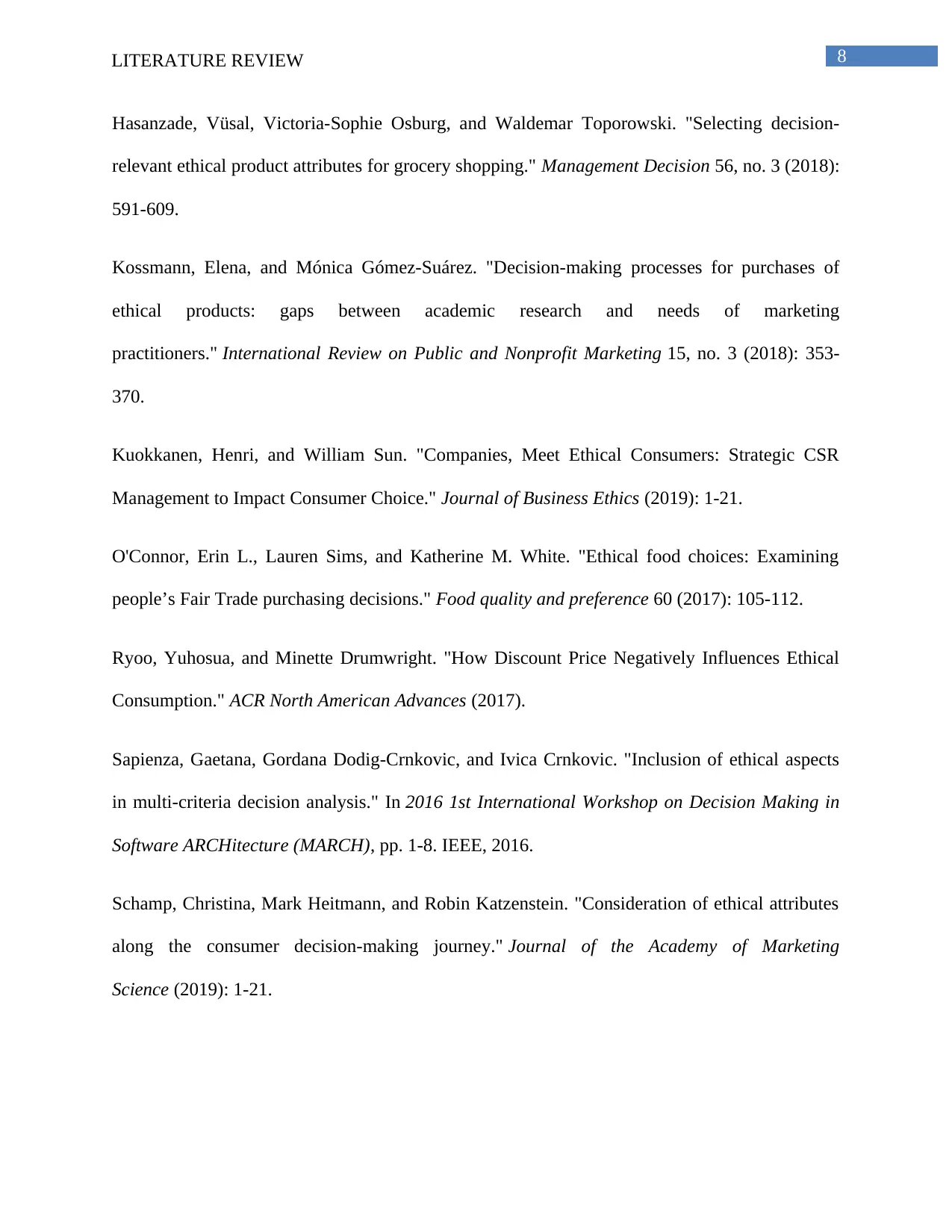
8LITERATURE REVIEW
Hasanzade, Vüsal, Victoria-Sophie Osburg, and Waldemar Toporowski. "Selecting decision-
relevant ethical product attributes for grocery shopping." Management Decision 56, no. 3 (2018):
591-609.
Kossmann, Elena, and Mónica Gómez-Suárez. "Decision-making processes for purchases of
ethical products: gaps between academic research and needs of marketing
practitioners." International Review on Public and Nonprofit Marketing 15, no. 3 (2018): 353-
370.
Kuokkanen, Henri, and William Sun. "Companies, Meet Ethical Consumers: Strategic CSR
Management to Impact Consumer Choice." Journal of Business Ethics (2019): 1-21.
O'Connor, Erin L., Lauren Sims, and Katherine M. White. "Ethical food choices: Examining
people’s Fair Trade purchasing decisions." Food quality and preference 60 (2017): 105-112.
Ryoo, Yuhosua, and Minette Drumwright. "How Discount Price Negatively Influences Ethical
Consumption." ACR North American Advances (2017).
Sapienza, Gaetana, Gordana Dodig-Crnkovic, and Ivica Crnkovic. "Inclusion of ethical aspects
in multi-criteria decision analysis." In 2016 1st International Workshop on Decision Making in
Software ARCHitecture (MARCH), pp. 1-8. IEEE, 2016.
Schamp, Christina, Mark Heitmann, and Robin Katzenstein. "Consideration of ethical attributes
along the consumer decision-making journey." Journal of the Academy of Marketing
Science (2019): 1-21.
Hasanzade, Vüsal, Victoria-Sophie Osburg, and Waldemar Toporowski. "Selecting decision-
relevant ethical product attributes for grocery shopping." Management Decision 56, no. 3 (2018):
591-609.
Kossmann, Elena, and Mónica Gómez-Suárez. "Decision-making processes for purchases of
ethical products: gaps between academic research and needs of marketing
practitioners." International Review on Public and Nonprofit Marketing 15, no. 3 (2018): 353-
370.
Kuokkanen, Henri, and William Sun. "Companies, Meet Ethical Consumers: Strategic CSR
Management to Impact Consumer Choice." Journal of Business Ethics (2019): 1-21.
O'Connor, Erin L., Lauren Sims, and Katherine M. White. "Ethical food choices: Examining
people’s Fair Trade purchasing decisions." Food quality and preference 60 (2017): 105-112.
Ryoo, Yuhosua, and Minette Drumwright. "How Discount Price Negatively Influences Ethical
Consumption." ACR North American Advances (2017).
Sapienza, Gaetana, Gordana Dodig-Crnkovic, and Ivica Crnkovic. "Inclusion of ethical aspects
in multi-criteria decision analysis." In 2016 1st International Workshop on Decision Making in
Software ARCHitecture (MARCH), pp. 1-8. IEEE, 2016.
Schamp, Christina, Mark Heitmann, and Robin Katzenstein. "Consideration of ethical attributes
along the consumer decision-making journey." Journal of the Academy of Marketing
Science (2019): 1-21.
⊘ This is a preview!⊘
Do you want full access?
Subscribe today to unlock all pages.

Trusted by 1+ million students worldwide
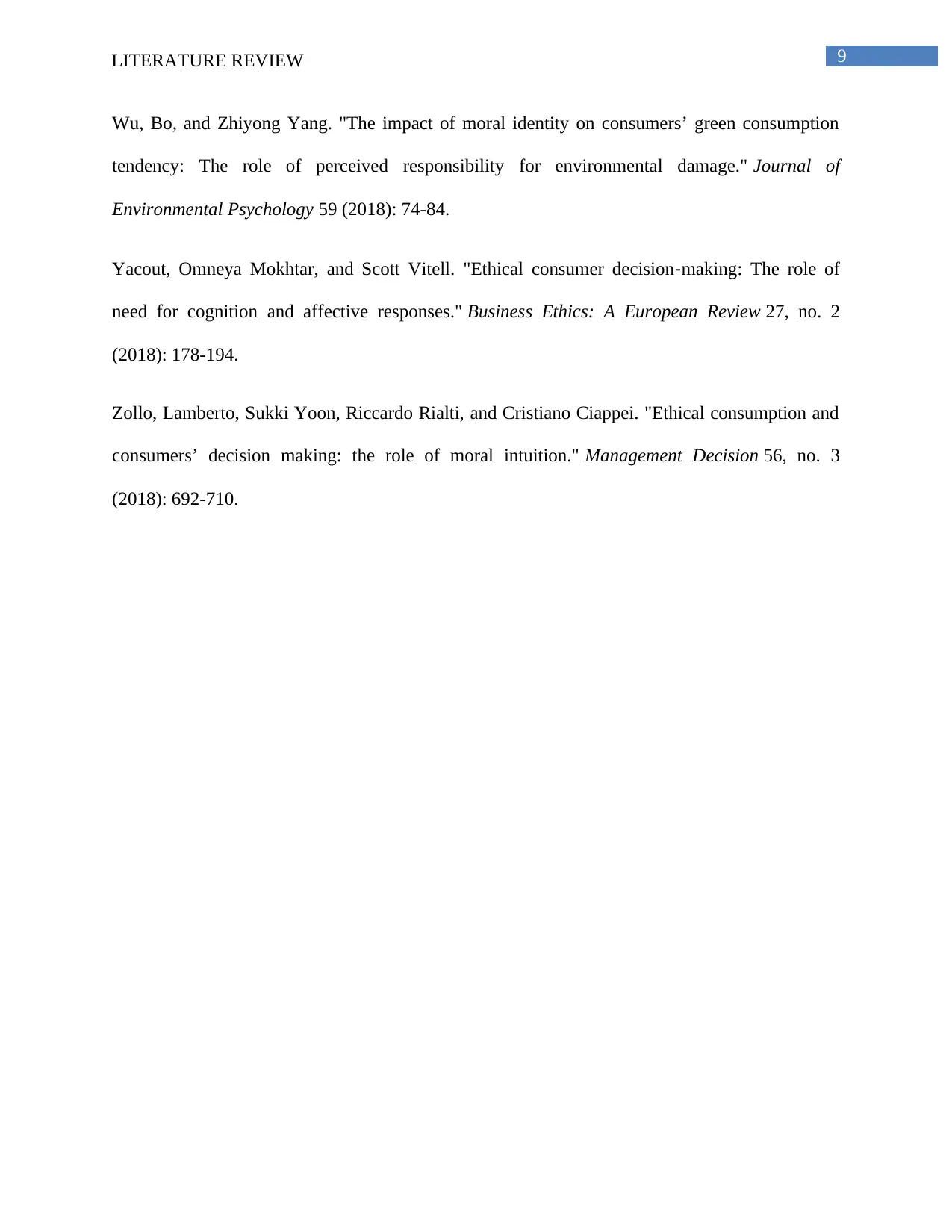
9LITERATURE REVIEW
Wu, Bo, and Zhiyong Yang. "The impact of moral identity on consumers’ green consumption
tendency: The role of perceived responsibility for environmental damage." Journal of
Environmental Psychology 59 (2018): 74-84.
Yacout, Omneya Mokhtar, and Scott Vitell. "Ethical consumer decision‐making: The role of
need for cognition and affective responses." Business Ethics: A European Review 27, no. 2
(2018): 178-194.
Zollo, Lamberto, Sukki Yoon, Riccardo Rialti, and Cristiano Ciappei. "Ethical consumption and
consumers’ decision making: the role of moral intuition." Management Decision 56, no. 3
(2018): 692-710.
Wu, Bo, and Zhiyong Yang. "The impact of moral identity on consumers’ green consumption
tendency: The role of perceived responsibility for environmental damage." Journal of
Environmental Psychology 59 (2018): 74-84.
Yacout, Omneya Mokhtar, and Scott Vitell. "Ethical consumer decision‐making: The role of
need for cognition and affective responses." Business Ethics: A European Review 27, no. 2
(2018): 178-194.
Zollo, Lamberto, Sukki Yoon, Riccardo Rialti, and Cristiano Ciappei. "Ethical consumption and
consumers’ decision making: the role of moral intuition." Management Decision 56, no. 3
(2018): 692-710.
Paraphrase This Document
Need a fresh take? Get an instant paraphrase of this document with our AI Paraphraser
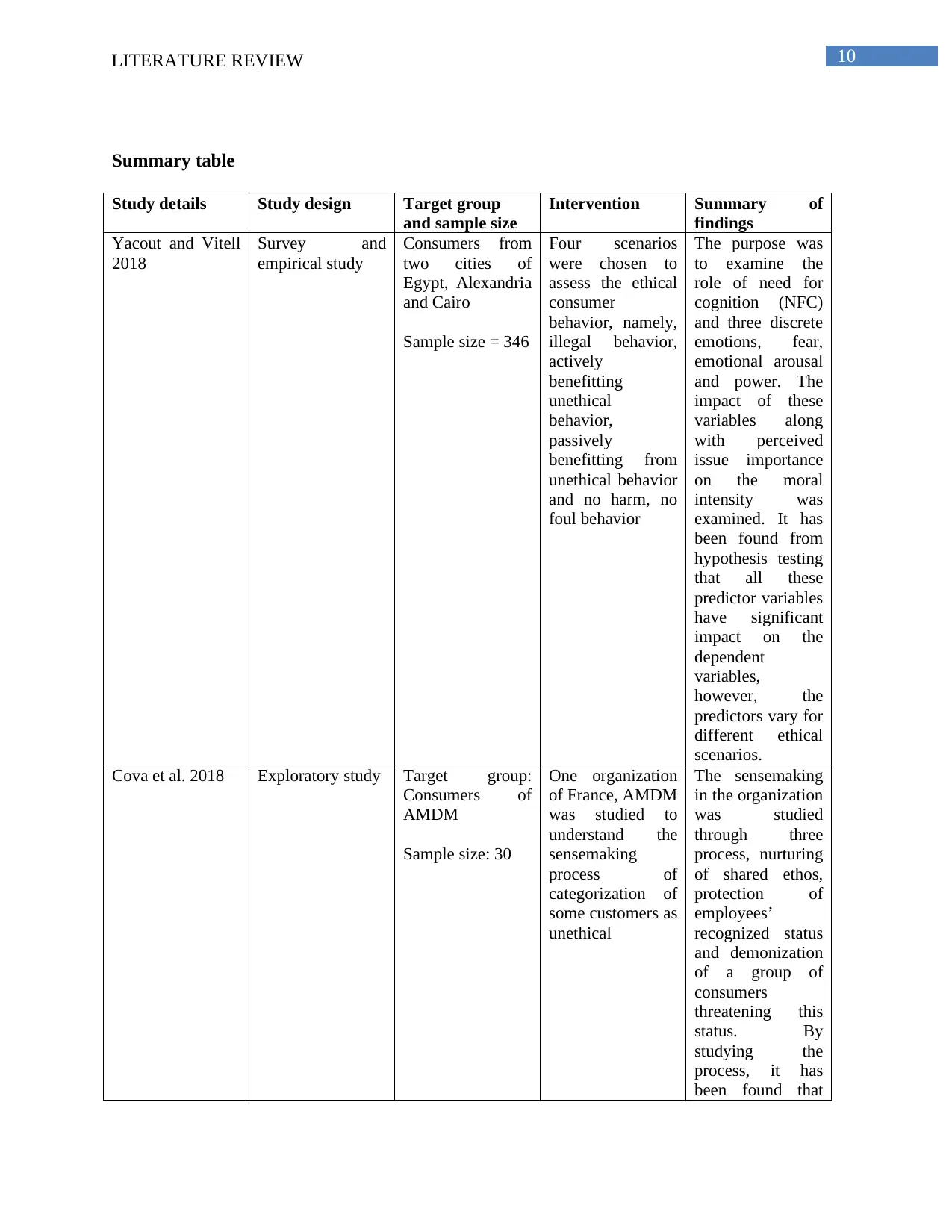
10LITERATURE REVIEW
Summary table
Study details Study design Target group
and sample size
Intervention Summary of
findings
Yacout and Vitell
2018
Survey and
empirical study
Consumers from
two cities of
Egypt, Alexandria
and Cairo
Sample size = 346
Four scenarios
were chosen to
assess the ethical
consumer
behavior, namely,
illegal behavior,
actively
benefitting
unethical
behavior,
passively
benefitting from
unethical behavior
and no harm, no
foul behavior
The purpose was
to examine the
role of need for
cognition (NFC)
and three discrete
emotions, fear,
emotional arousal
and power. The
impact of these
variables along
with perceived
issue importance
on the moral
intensity was
examined. It has
been found from
hypothesis testing
that all these
predictor variables
have significant
impact on the
dependent
variables,
however, the
predictors vary for
different ethical
scenarios.
Cova et al. 2018 Exploratory study Target group:
Consumers of
AMDM
Sample size: 30
One organization
of France, AMDM
was studied to
understand the
sensemaking
process of
categorization of
some customers as
unethical
The sensemaking
in the organization
was studied
through three
process, nurturing
of shared ethos,
protection of
employees’
recognized status
and demonization
of a group of
consumers
threatening this
status. By
studying the
process, it has
been found that
Summary table
Study details Study design Target group
and sample size
Intervention Summary of
findings
Yacout and Vitell
2018
Survey and
empirical study
Consumers from
two cities of
Egypt, Alexandria
and Cairo
Sample size = 346
Four scenarios
were chosen to
assess the ethical
consumer
behavior, namely,
illegal behavior,
actively
benefitting
unethical
behavior,
passively
benefitting from
unethical behavior
and no harm, no
foul behavior
The purpose was
to examine the
role of need for
cognition (NFC)
and three discrete
emotions, fear,
emotional arousal
and power. The
impact of these
variables along
with perceived
issue importance
on the moral
intensity was
examined. It has
been found from
hypothesis testing
that all these
predictor variables
have significant
impact on the
dependent
variables,
however, the
predictors vary for
different ethical
scenarios.
Cova et al. 2018 Exploratory study Target group:
Consumers of
AMDM
Sample size: 30
One organization
of France, AMDM
was studied to
understand the
sensemaking
process of
categorization of
some customers as
unethical
The sensemaking
in the organization
was studied
through three
process, nurturing
of shared ethos,
protection of
employees’
recognized status
and demonization
of a group of
consumers
threatening this
status. By
studying the
process, it has
been found that
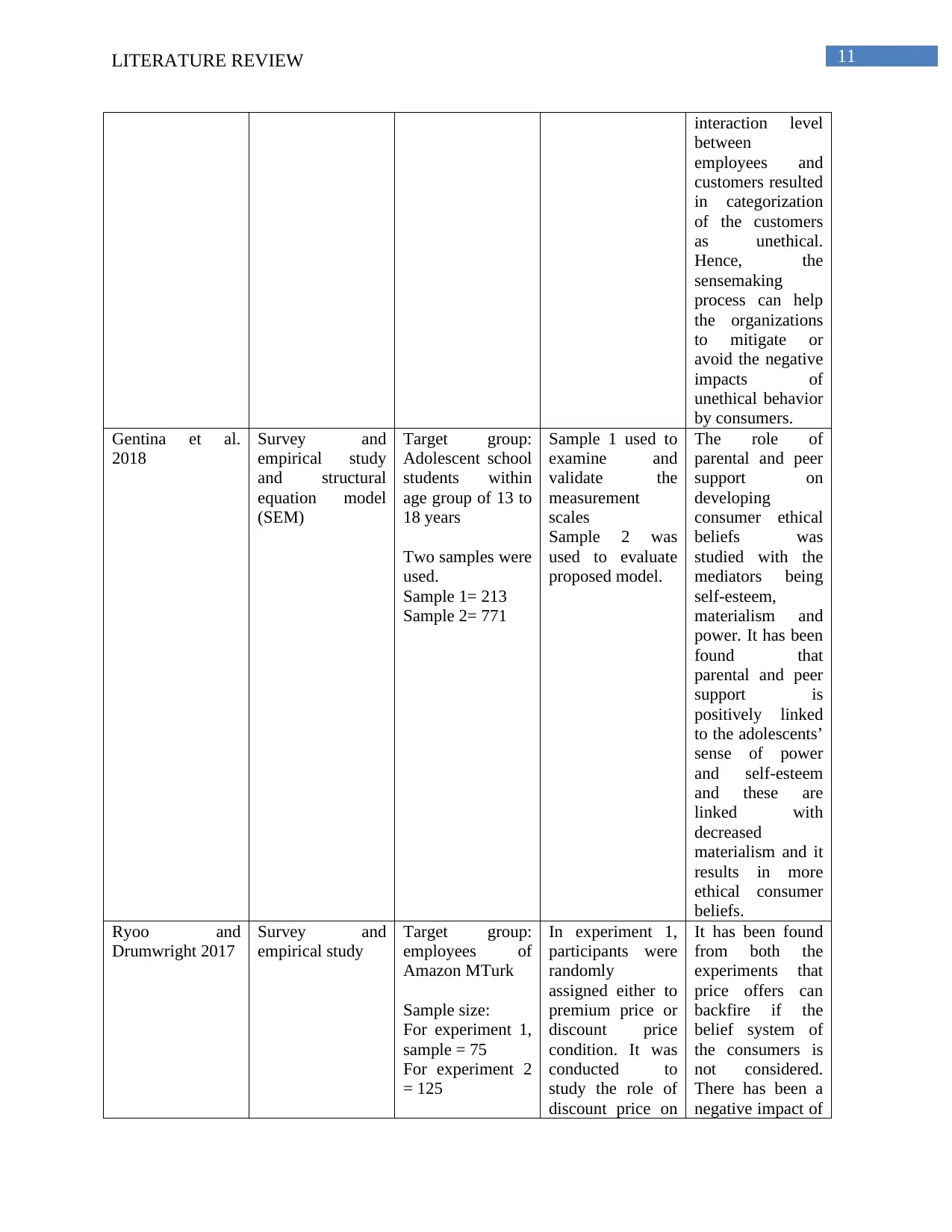
11LITERATURE REVIEW
interaction level
between
employees and
customers resulted
in categorization
of the customers
as unethical.
Hence, the
sensemaking
process can help
the organizations
to mitigate or
avoid the negative
impacts of
unethical behavior
by consumers.
Gentina et al.
2018
Survey and
empirical study
and structural
equation model
(SEM)
Target group:
Adolescent school
students within
age group of 13 to
18 years
Two samples were
used.
Sample 1= 213
Sample 2= 771
Sample 1 used to
examine and
validate the
measurement
scales
Sample 2 was
used to evaluate
proposed model.
The role of
parental and peer
support on
developing
consumer ethical
beliefs was
studied with the
mediators being
self-esteem,
materialism and
power. It has been
found that
parental and peer
support is
positively linked
to the adolescents’
sense of power
and self-esteem
and these are
linked with
decreased
materialism and it
results in more
ethical consumer
beliefs.
Ryoo and
Drumwright 2017
Survey and
empirical study
Target group:
employees of
Amazon MTurk
Sample size:
For experiment 1,
sample = 75
For experiment 2
= 125
In experiment 1,
participants were
randomly
assigned either to
premium price or
discount price
condition. It was
conducted to
study the role of
discount price on
It has been found
from both the
experiments that
price offers can
backfire if the
belief system of
the consumers is
not considered.
There has been a
negative impact of
interaction level
between
employees and
customers resulted
in categorization
of the customers
as unethical.
Hence, the
sensemaking
process can help
the organizations
to mitigate or
avoid the negative
impacts of
unethical behavior
by consumers.
Gentina et al.
2018
Survey and
empirical study
and structural
equation model
(SEM)
Target group:
Adolescent school
students within
age group of 13 to
18 years
Two samples were
used.
Sample 1= 213
Sample 2= 771
Sample 1 used to
examine and
validate the
measurement
scales
Sample 2 was
used to evaluate
proposed model.
The role of
parental and peer
support on
developing
consumer ethical
beliefs was
studied with the
mediators being
self-esteem,
materialism and
power. It has been
found that
parental and peer
support is
positively linked
to the adolescents’
sense of power
and self-esteem
and these are
linked with
decreased
materialism and it
results in more
ethical consumer
beliefs.
Ryoo and
Drumwright 2017
Survey and
empirical study
Target group:
employees of
Amazon MTurk
Sample size:
For experiment 1,
sample = 75
For experiment 2
= 125
In experiment 1,
participants were
randomly
assigned either to
premium price or
discount price
condition. It was
conducted to
study the role of
discount price on
It has been found
from both the
experiments that
price offers can
backfire if the
belief system of
the consumers is
not considered.
There has been a
negative impact of
⊘ This is a preview!⊘
Do you want full access?
Subscribe today to unlock all pages.

Trusted by 1+ million students worldwide
1 out of 17
Related Documents
Your All-in-One AI-Powered Toolkit for Academic Success.
+13062052269
info@desklib.com
Available 24*7 on WhatsApp / Email
![[object Object]](/_next/static/media/star-bottom.7253800d.svg)
Unlock your academic potential
Copyright © 2020–2026 A2Z Services. All Rights Reserved. Developed and managed by ZUCOL.





